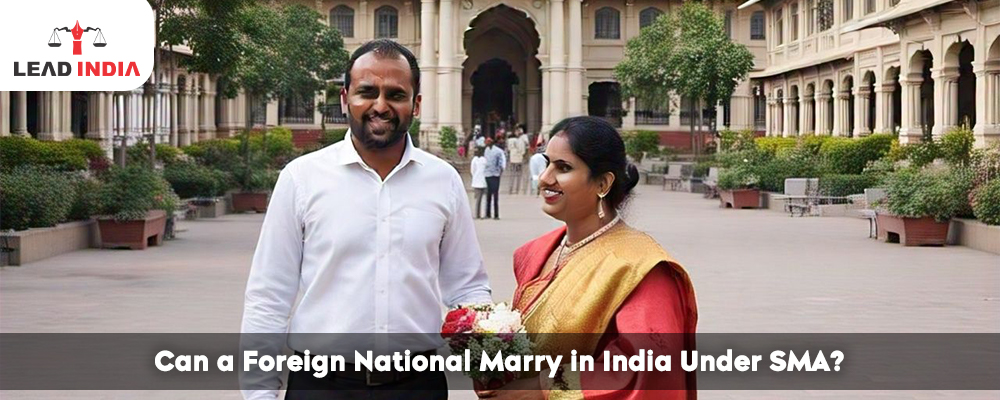Marriage is an indispensable right and it is an integral component of all social relations. The Special Marriage Act of 1954 was introduce in India to provide a unified legal structure for civil marriages without taking into consideration the issues of religion, caste, or nationalities. It enables a person and a different religion, including foreign nationals, to marry in India.
Special Marriage Act: About
- The Special Marriage Act, enacted in 1954, is a non-religious legal enactment that allows for the marriage of any two individuals without the bindings of any personal religious marriage laws.
- This Act was enact to help individuals who wish to enter into an interreligious, intercaste, or international marriage so that such couples can enjoy the protection of the law.
- What makes SMA different is that it also provides for marriage without religious observance. Family protection in this case is or has to be secure through civil law and therefore, the law is not limite to people of one religion or even to the citizens of a particular country.
Need A Legal Advice
The internet is not a lawyer and neither are you. Talk to a real lawyer about your legal issue

Foreign National Marrying in India under SMA
Eligibility:
To marry in India under the Special Marriage Act, a foreign national needs to satisfy particular eligibility conditions:
Age Requirements:
- The groom’s minimum age shall be twenty-one years.
- The bride’s minimum age shall be eighteen years.
Mental Capacity:
At the time of marriage, both individuals should be of sound mind, able to give consent, and should not suffer from any laws applicable that may make their marriage void.
Marital Status:
- At least one party to the marriage must not have a living spouse at the marriage date.
- They should not be within the degrees of the prohibited relationship as defined under the Act unless one of them brings in a relevant custom that permits such marriage.
Residency Requirements:
No marriage notice shall be lodge with any marriage officer unless the parties involve have been residing within the area of jurisdiction of the marriage officer for more than thirty days.
Documents Required
Identity Verification:
- Passport only (for foreign nationals)
- Visa or OCI/PIO cards
Residential Evidence:
For all applicants, a document as to residence in India for not less than 30 days. (e.g. As rental agreement utility bill or proof of hotel stay)
Birth Certificate:
To establish the correct age of the parties concerned.
Single Status Certificate:
A certificate or an affidavit issued in the home country of the foreign national confirming her unmarried status, divorce, or widowhood (whichever is appropriate).
Affidavit in support of marriage:
An affirmation that there is no legal implication to support the marriage.
Passport Photos:
Usually required are about 3 or 4 copies.
Documents of Witnesses:
Identification and address proof for three witnesses who shall be present at the ceremony of marriage.
Further Consular Papers:
Some foreign nationals are also require to obtain a No Objection Certificate (NOC) from their embassies in India.
Procedure:
Filing of Notice of Intended Marriage:
- The couple must submit a written notice of their intention to marry to the Marriage Officer in whose jurisdiction either party has resided for at least 30 days.
- The notice shall contain names, addresses, ages, and other particulars of both parties.
Publication of Notice:
- After the notice is receive, the Marriage Officer displays it in a prominent location in his or her office.
- A thirty (30) day period will lapse if anyone who wants to object to the marriage on any legal grounds believes it to be in contravention of the law.
Addressing Objections:
- Where such objections are raise, the Marriage Officer shall inquire within thirty (30) days.
- In case the objections are upheld, no marriage can be conduct. In any other case, the couple may proceed with the marriage.
Solemnization of Marriage:
- Followed by the absence of reservations, the marriage takes place in the office of the Marriage Officer.
- In the presence of the Marriage Officer and three other witnesses, both parties must express their intention to marry.
- Together with the marriage certificate which is sign by the couple’s representatives, the Marriage Officer also signs and seals the sign contract.
Challenges Faced by Foreign Nationals
- Cultural and Language Constraints: One of the challenges one may face while understanding the legal practices in a different country is the primary use of languages one is not familiar with.
- Procrastination in Documentation: It would take up to several weeks to arrange for the neither objection certificate nor single status certificate in the foreign national’s country of origin.
- Institutional Problems: Indian governments are often describe as being neither quick nor reliable. Therefore, they need patience and understanding.
- Challenges to the Petitioners During the Notice Period: The public raising objections during the notice period of 30 days can bring about uncertainty in the proceedings and even cause a delay.
- Visa-Related Issues: Difficulties may arise in completing the marriage formalities if the foreign national’s associated visa expires before the end of the marriage process.
- Acceptance in Other Countries: Such countries may impose further conditions for allowing a marriage registered in India under the SMA to be recognize in their territories.
The Special Marriage Act of 1954 contains a simple set of principles and rules that facilitate foreign nationals to get marry in India. Although the process involves stages of specific legality and procedure, it can be make easier with adequate planning and arrangements.
One can talk to a lawyer from Lead India for any kind of legal support. In India, free legal advice online can be obtain at Lead India. Along with receiving free legal advice online, one can also ask questions to the experts online for free through Lead India.



